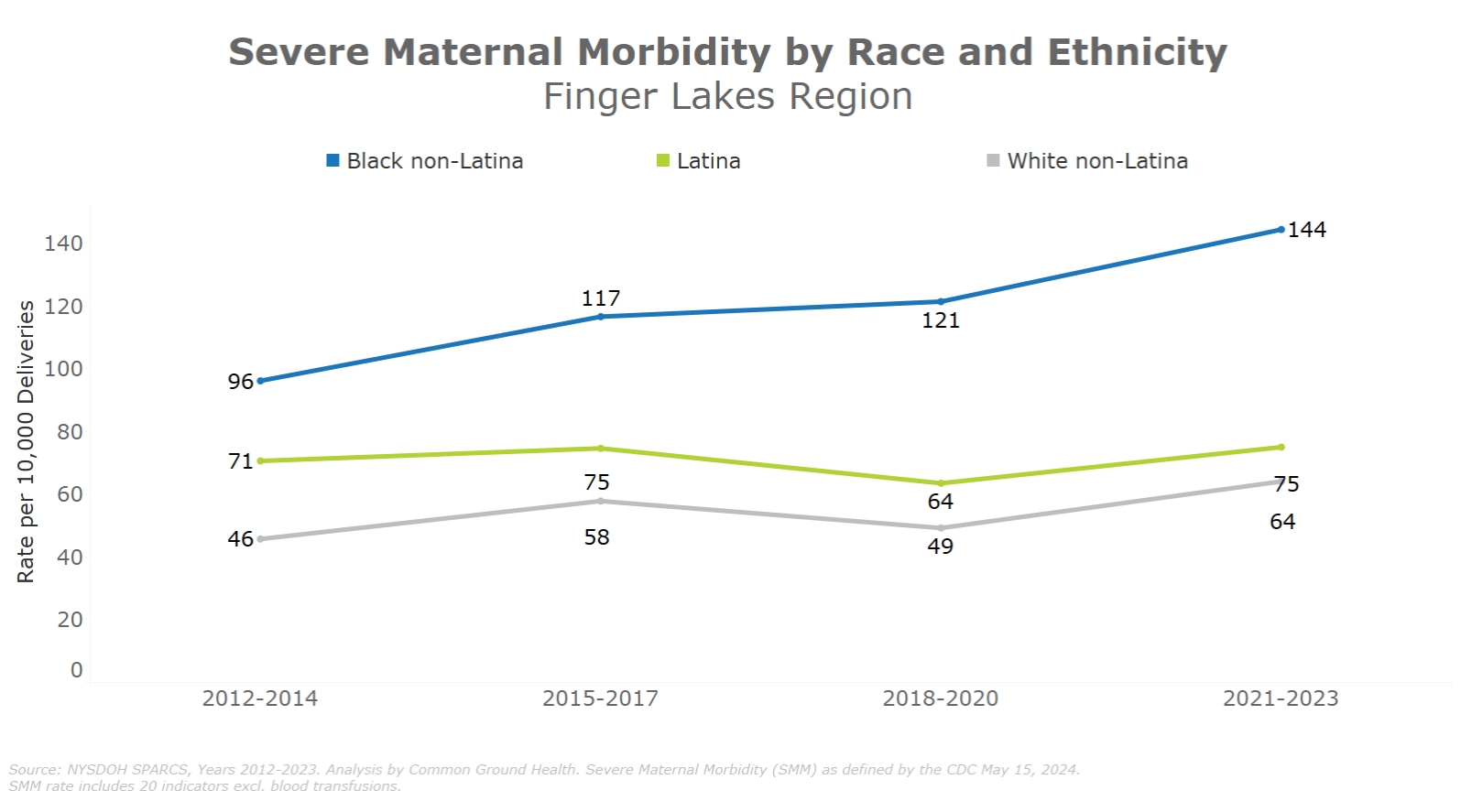How Rochester is Creating Change for Black Maternal Health
How Rochester is Creating Change for Black Maternal Health
Did you know? In the U.S., Black women are four to five times more likely to die from a pregnancy-related cause than white women. According to the Healthy Baby Network, a leading Rochester nonprofit in Black maternal health education and advocacy, the maternal mortality rate in the Finger Lakes region is 60 percent higher than the New York State average.

The raw SPARCS data used to produce this publication was provided by the New York State Department of Health. However, the calculations, metrics, conclusions derived, and views expressed herein are those of the author(s) and do not reflect the work, conclusions, or views of New York State. The New York State Department of Health, its employees, officers, and agents make no representation, warranty or guarantee as to the accuracy, completeness, currency, or suitability of the information provided here.
The rate of severe maternal morbidity (life-threatening complications of pregnancy or childbirth) has increased 52 percent for mothers who are Black, non-Latina from a rate of 99/10,000 deliveries in the 2012-2014 time period to a rate of 151/10,000 deliveries in the 2021-2023 time period. This is much worse than the overall trend for all deliveries in Monroe County, increasing by 27 percent to 66 per 10,000 during the same period (as reported by Common Ground Health).
“Black maternal health continues to be a critical issue that demands attention and support,” shares Edith Williams, PhD, MS, director of UR Medicine’s Center for Community Health & Prevention (CCHP) and founding director of the Office of Health Equity Research. “We all have a role to play in ensuring that every Black mother and family has the opportunity to thrive.”
What You Can Do
Join the Maternal Child Health Advisory Group
This group meets quarterly via Zoom and all are welcome. Contact Theresa Green, PhD, MBA, director of Community Health Education & Policy, if interested in learning more.
Addressing disparities in maternal and child health has been a priority area of the Monroe County Community Health Improvement Plan for several years, with the Maternal Child Health Advisory Group building collaborations between many stakeholders working on this issue. The group is made up of more than 100 members from over 30 organizations or departments across the county, including many representatives from our region’s major health systems.
Last fall, many of these changemakers came together for the annual Dr. Bernard Guyer Lecture Series that focused on Black maternal health. The event, hosted by the CCHP, featured a keynote presentation "Are Black Women Safe Giving Birth: The Hard Truth of How Racism and Discrimination Perpetuate Disparities in Maternal Mortality" by the Honorable Dorcey L. Applyrs, DrPH, MPH, who shared her lived experience.
A panel of area experts also discussed local efforts geared toward improving Black maternal health and the work that still needs to be done. The event encouraged difficult and motivating conversations and has resulted in monthly, ongoing in-person meetings between the panelists, as well as other leaders added for their insight and expertise.
“The goal of the group is to identify how we can address Black maternal health and facilitate change in the care provided, as well as health outcomes for this population,” shared panelist Danielle Jones, LMHC, owner of Place of Wisdom, a maternal mental health practice in Rochester, NY.
“Our ability to successfully work together is a true example of the type of collaboration that is needed to address the Black maternal health crisis. It cannot be done in silos. We all bring something unique to the table - different ideas, skills, access to data, funding, and direct access to Black mothers.” The group is focused on gathering relevant, up-to-date data, both qualitative and quantitative, on diverse maternal experiences during and after pregnancy.